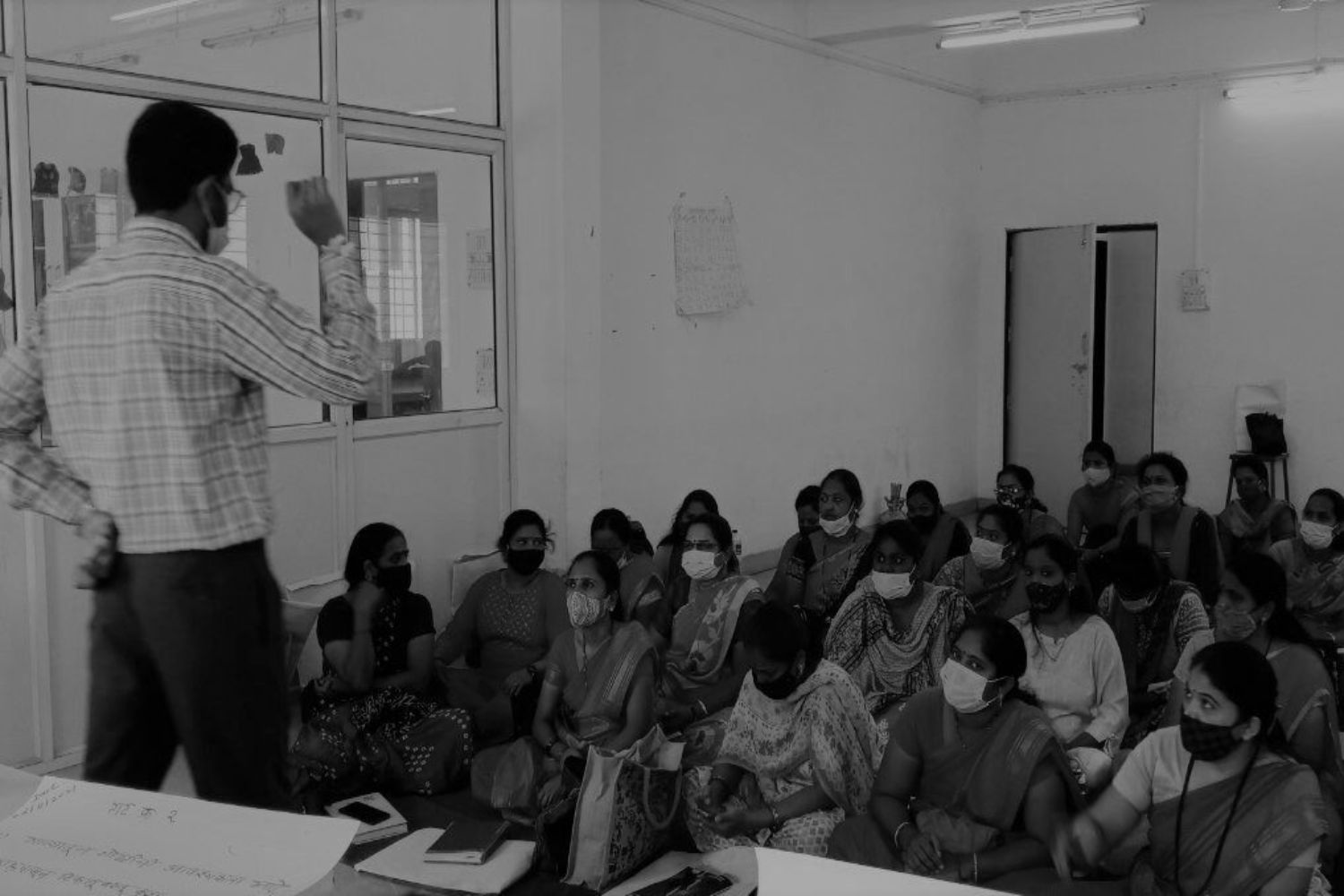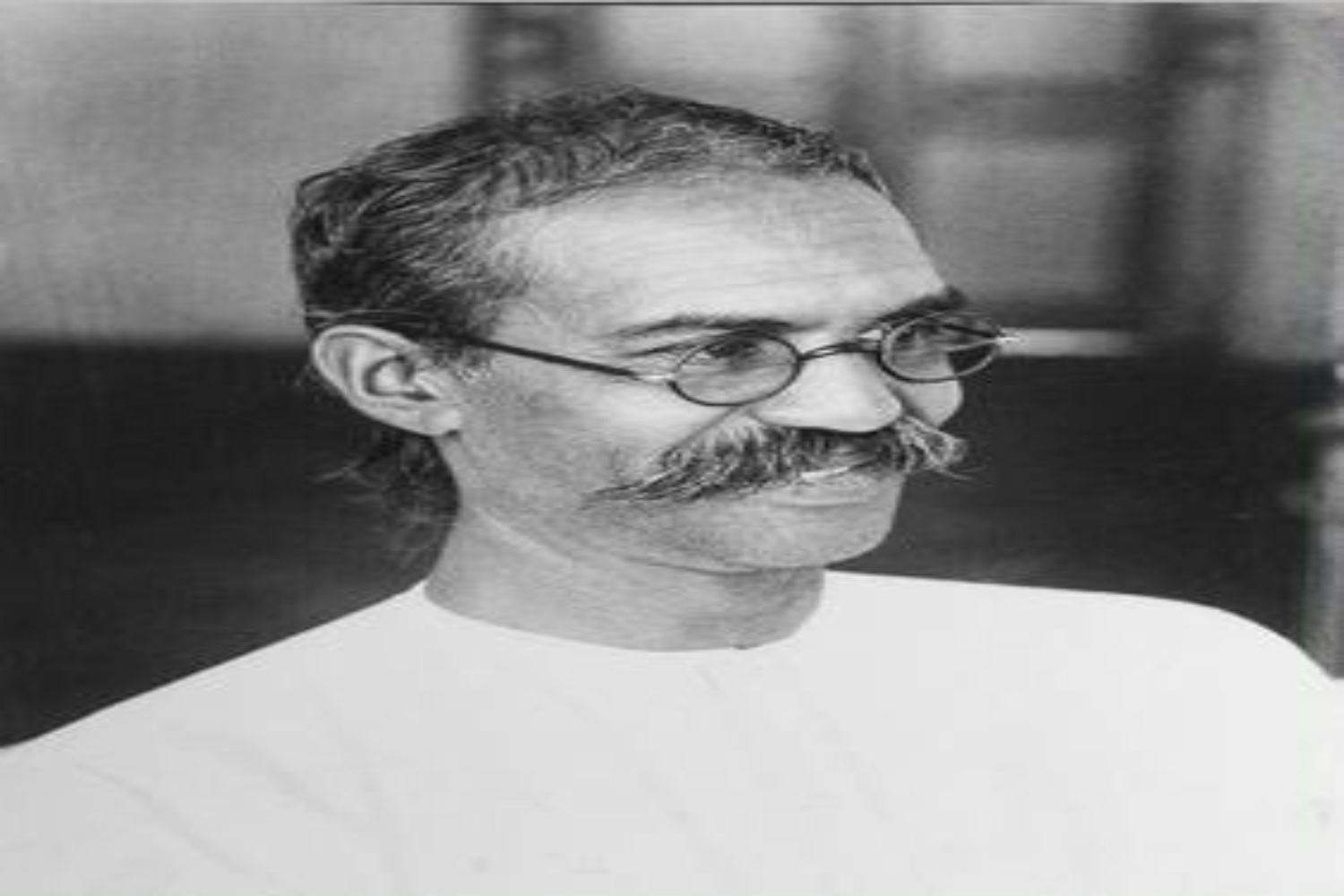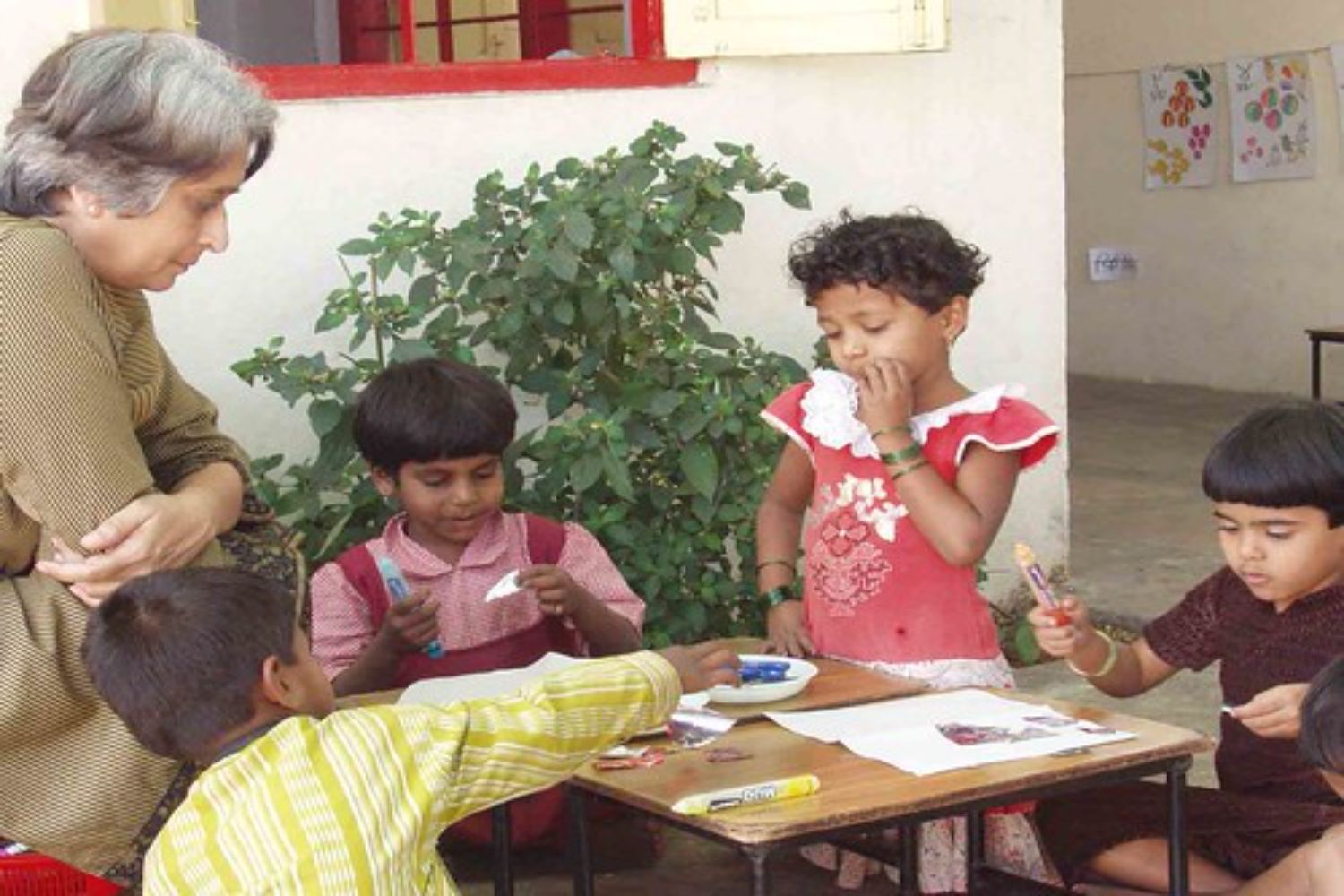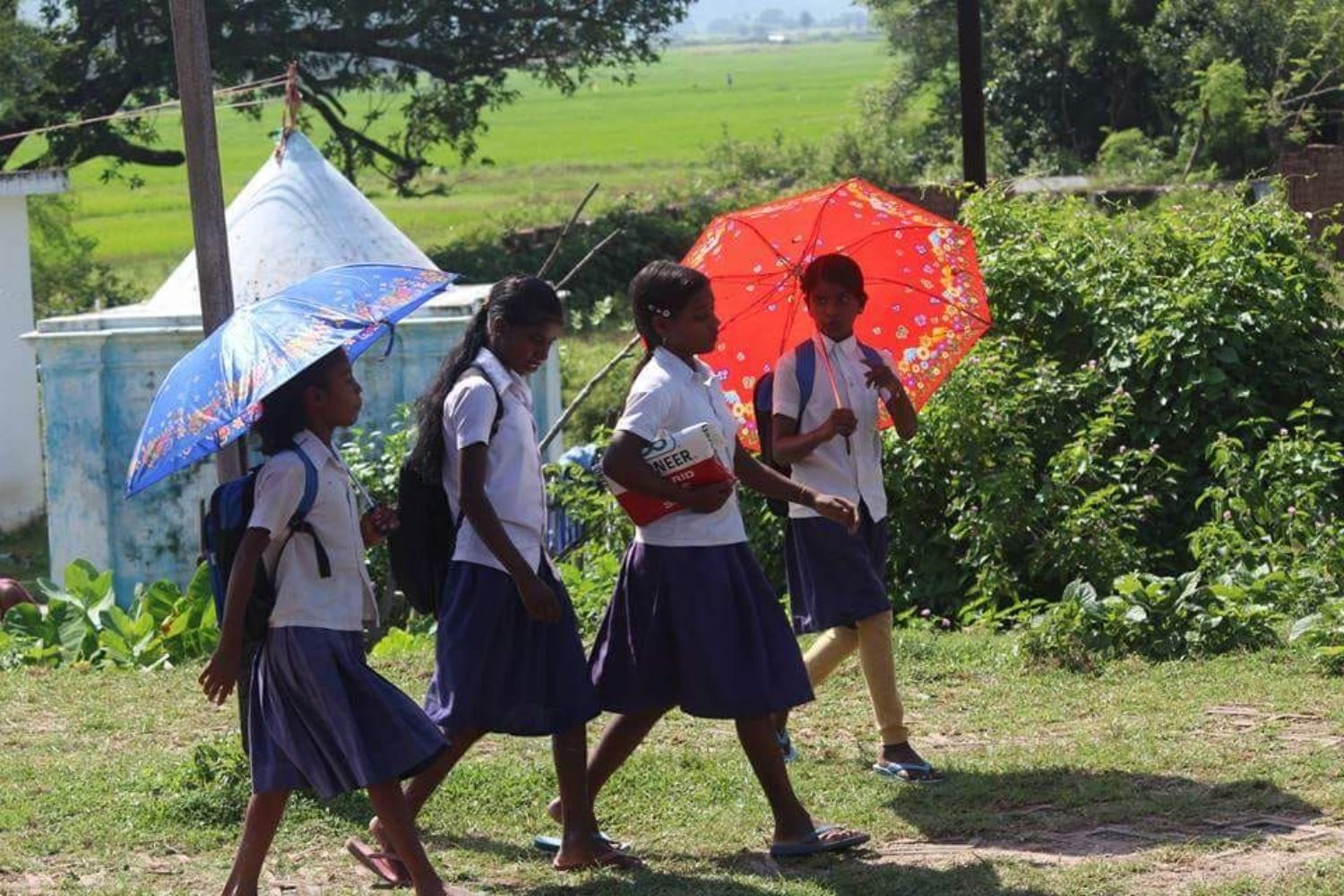Early childhood education in urban Anganwadis – Some concerns in the context of the FLN mission
In his essay titled ‘Early childhood education in urban Anganwadis,’ Atul Gaikwad discusses how we can use the ICDS system effectively to cater to the educational needs of young children from marginalized social groups living in urban areas.

Scene 1: An Anganwadi teacher, in her small Anganwadi space, arranges children in semi-circular seating and is conducting a language development activity. Children are engrossed and looking at the teacher. Suddenly, one man enters the Anganwadi carrying a big container of Khichdi. He starts talking to the Anganwadi teacher, asking for the empty container.
The Anganwadi teacher leaves the activity in between and hands over the empty container to the man. He pours the khichadi into the container and slides it into the middle of the Anganwadi. The noise of the sliding container and the smell of the khichadi spread all over the Anganwadi.
Scene 2: An Anganwadi teacher is conducting circle time activities. However, some parents seating at the back of the Anganwadi are busy in the mundane act of chatting.
Scene 3: There is a district-level meeting of teachers, kendra-pramukhs, and other officers, on preparing the implementation plan of the FLN mission. However, neither an Anganwadi teacher nor a supervisor is invited for the meeting.
Scene 4: An Anganwadi teacher is helping children to eat from their tiffin boxes. Suddenly one local person enters the Anganwadi asking the teacher about some documents. Anganwadi teacher asks that person to come again, once the ECE (Early Childhood Education) session gets over.
These can be day-to-day instances from any urban Anganwadi. The scenes mentioned above highlight our priorities as a society. Research from across the world on education, neuroscience and economics demonstrates clearly that ensuring free, accessible, high-quality ECCE is perhaps the very best investment that any country can make for its future. Through Anganwadis, we have ensured in making ECCE services free and accessible to a great extent. However, are we doing enough? What are are issues that we must address?

NEP has given supreme importance to ECE. It has included ages 3 to 6 years in the foundational stage of education. It has also suggested the formation of a nationallevel mission – Nipun Bharat Mission (NBM) – on foundational literacy and numeracy. NBM takes the approach of competencybased teaching. It has three goals, each one focusing on a set of competencies. These competencies are acquired by the attainment of some learning outcomes (LOs).
The Nipun Bharat guidelines acknowledge the importance of ECE in achieving foundational literacy and numeracy at the end of grade 3. These guidelines state LOs for children in the age groups of 3-4, 4-5 and 5-6 in a detailed manner. Maharashtra already had a well thought out ECE curriculum (Aakar). However, NBM brings more clarity about the age-appropriate changes we all want to see in children.
In the upcoming years, with the launch of NBM, there is a high chance that the ECE space will have remarkable changes. Anganwadi teachers and helpers, along with the supervisors and officers, and NGO representatives, will witness this change. The process of adopting change will involve the capacity building of Anganwadi teachers and helpers through training and learning spaces. However, in addition to that, there are several complex issues and concerns that need attention. These issues are discussed underneath.
Convergence: Achieving foundational literacy and numeracy needs a lot of convergence with multiple departments, offices and ministries. This convergence is very difficult to achieve if there is no plan and if the approach is not inclusive.
During our Anganwadi teacher training workshop, we found that 76% of Anganwadi teachers were unaware of NBM. Most of the Anganwadi supervisors, and child development project officers (CDPOs), are also not sure about the implementation of the mission. The foundational stage sees ages 3 to 8 as one continuum, where children learn in a certain way. Children from 3 to 6 years of age go to Anganwadis for preschool education. And those who are in the age group of 6 to 8 years go to primary schools.
Anganwadi centres in Maharashtra will be linked to the nearby primary schools, so that the latter can help Anganwadi teachers to achieve the desired outcome in early childhood education. However, this initiative does not make any sense in practical terms. The preschool teaching pedagogy is very different than that of the Anganwadis.
On the contrary, primary teachers should adopt the play-based, activity-based pedagogy practiced in Anganwadis, if they want to teach in the foundational stage in a true sense. The collaboration (without any superiority-inferiority complex) between Anganwadi teachers and primary teachers seems a very romantic idea. In cities, where there is a school with a pre-primary section located near the Anganwadi, this convergence becomes a bit complex.
The problem of inadequate space: ICDS is primarily a village scheme. In Maharashtra, there are around 1.1 lakh Anganwadis. Out of these, 14% Anganwadis (15,500 Anganwadis) are urban. These urban Anganwadis face a lot of challenges in terms of resources. Currently, BELIEF is working with 54 urban Anganwadis. Only 17% of these Anganwadis have some dedicated and lockable space. The rest of the Anganwadis run in a rented space that they can access only for three–four hours. There are often restrictions on the usage of electricity and wall space.
Most of these rented spaces are the living rooms of some families. These rooms have the furniture and other stuff of the house owner. Family members of the owner pass through these rooms while Anganwadi teachers conduct ECE sessions. Some Anganwadis run on a porch. Some others run in balconies or parking spaces as well. Is it possible for a teacher to follow the timetable suggested by the state curriculum while dealing with these challenges?
In cities, Anganwadis function hardly for two hours. And we cannot blame Anganwadi workers for this. There are deep-rooted societal and systemic issues that end up making ECE an activity done in a very casual manner with almost no priority given to it at all.
Services offered by Anganwadi centres
- Supplementary nutrition
- Immunization
- Healthcare check-ups
- Referral health services
- Non-formal pre-school education
- Nutrition and health education
Enrolment: BELIEF has observed that children receiving ECE services in Anganwadis belong to the most underprivileged backgrounds. Anganwadis are the biggest preschool service provider for children below 6 years of age. There is no centralized reliable data available for private preschools. These preschools might have a comparable share in terms of the number of children catered to.
Day by day, the number of children coming to Anganwadis is reducing. Designing ECE, particularly for children belonging to the 4 to 6 years age group, is very critical. However, this age group has the lowest enrolment rates in urban Anganwadis.
The mushrooming of low-fee private schools and aspiration for the English language has impacted the enrolment in Anganwadis. Only parents who cannot afford the private school fees send their children to Anganwadis. The general bias that private schools are better than Anganwadis is observable even in Anganwadi teachers. Thus, attracting children to Anganwadis, and building parental trust that the Anganwadi is an important space for their child’s future, are some of the important challenges that Anganwadi teachers face.
Systemic design: Anganwadis function under the ICDS program under the Department of Women and Child Development. They offer six services to the population in their jurisdiction. ECE (‘non-formal education’ as termed in ICDS scheme documents) is one of these services.
One teacher along with the helper is expected to cater to all these services to different beneficiary groups. Health and nutrition are always given prime importance and ECE takes the back seat.
Up till now, the design of the program, our national priorities, and our approach toward children in the early years have made everyone habitual to give less priority to ECE. The notion that, “It is okay if the child is not learning anything. He should come to the Anganwadi and have nutritious food,” must change. We have to take a position and say that education is equally important and is a serious affair. The system should plan for and gather all the resources required for the successful implementation of the Aakar curriculum in each Anganwadi.
Academic support, monitoring and evaluation: Anganwadi teachers mostly work in isolation. A supervisor is expected to monitor all the Anganwadis in a bit (cluster of around 25), and report to the ICDS’ child development project officer (CDPO). However, many of the supervisor posts are vacant. Current supervisors are given the extra charge of one or two bits. Thus, the number of Anganwadis under one supervisor often becomes beyond their supervision capacity.
Anganwadis do not maintain any formative assessment of each child. Thus, a majority of academic decisions are taken either randomly or based on prior experience. The culture of data-driven analysis of the situation and taking informed decisions need to be inculcated to strengthen ECE in Anganwadis.
Anganwadi teachers gather every month for cluster (bit) meetings held by supervisors. These meetings are often held to collect data and perform other administrative tasks. The restructuring of the bit meetings and aligning them to the discussion on ECE will help build an academic support structure for Anganwadi teachers.
Conclusion:
The quality of ECE has a lifelong impact on an individual’s life. Anganwadis play a very significant role in ensuring a safe and dignified future for children from underprivileged backgrounds. Thus, improving the quality of ECE transacted in Anganwadis has a big social relevance.
Nipun Bharat Mission brings ECE to the forefront. The mission’s goals are difficult Reflection to translate into reality. However, it is not an impossible task. With political and administrative will, the concerns mentioned above can be easily addressed.
Involving parents in the process of ECE, leveraging technology to address issues, and creating a teacher support structure to ensure the continuous learning of teachers will definitely add value.
A focussed, systemic and planned intervention to address all the relevant issues related to ECE can help us advance in a positive direction.




No approved comments yet. Be the first to comment!